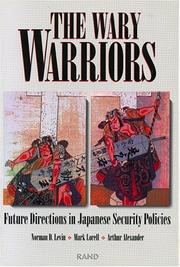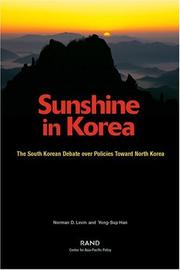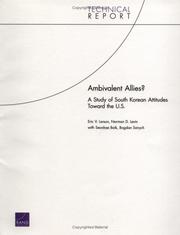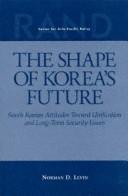| Listing 1 - 10 of 12 | << page >> |
Sort by
|
Book
ISBN: 1598750941 Year: 2004 Publisher: Santa Monica : RAND Corporation,
Abstract | Keywords | Export | Availability | Bookmark
 Loading...
Loading...Choose an application
- Reference Manager
- EndNote
- RefWorks (Direct export to RefWorks)
The United States and South Korea enjoy many benefits from close security cooperation but the relationship, although not currently endangered, is shifting. Although Korea is assuming more military responsibilities, action is needed to address Korea's desire for a more equal partnership.
Book
ISBN: 1281736511 9786611736514 0833045962 0833044060 9780833045966 9780833044068 9781281736512 6611736514 Year: 2008 Publisher: Santa Monica, CA RAND Corp.
Abstract | Keywords | Export | Availability | Bookmark
 Loading...
Loading...Choose an application
- Reference Manager
- EndNote
- RefWorks (Direct export to RefWorks)
In seeking a modernized North Korea, the focus should be on stimulating a gradual modernization of the North Korean system rather than removing the regime. With this tenet in mind, six institutions in five countries that have key interests in North Korea?s future undertook a collaborative effort to determine ways in which the North Korean system could move toward modernization over the medium to long term. This endeavor can be viewed as ?participatory systems analysis? in that the participants, in analyzing the North Korean system and how to motivate its modernization, fused their sometimes di
Annexation (Municipal government). --- Local government. --- Annexation (Municipal government) --- Annexation (County government) --- Economic development --- Local Government - U.S. --- Government - U.S. --- Law, Politics & Government --- Government - Non-U.S. --- Government - Asia --- Economic aspects --- Korea (North) --- Politics and government --- Economic policy. --- Military policy. --- Development, Economic --- Economic growth --- Growth, Economic --- County annexation --- Municipal annexation --- Korean People's Republic --- People's Democratic Republic of Korea --- Koreĭskai︠a︡ Narodno-Demokraticheskai︠a︡ Respublika --- Korea (North Korean Government) --- Democratic People's Republic of Korea --- North Korea --- KNDR --- Chʻao-hsien min chu chu i jen min kung ho kuo --- Koreai Népi Demokratikus Köztársaság --- Korea (Democratic People's Republic) --- K.N.D.R. --- K.R.L.D. --- Korea (People's Democratic Republic) --- Korean People's Democratic Republic --- Chōsen Minshu Shugi Jinmin Kyōwakoku --- Chosŏn Minjujuŭi Inmin Konghwaguk --- KRLD --- Koreańska Republika Ludowo-Demokratyczna --- Kūriyā al-Dīmuqrāṭīyah --- D.P.R.K. --- DPRK --- Corée du Nord --- República Popular Democrática de Corea --- Corea (North) --- North Korean Interim Government --- Chosun Minchu-chui Inmin Konghwa-guk --- Economic policy --- Economics --- Statics and dynamics (Social sciences) --- Development economics --- Resource curse --- Cities and towns --- County government --- Local government --- Metropolitan areas --- Metropolitan government --- Municipal corporations --- Municipal government --- Municipal incorporation --- Growth --- Chaoxian minzhu zhuyi renmin gongheguo --- 朝鲜民主主义人民共和国
Book
Year: 1994 Publisher: Santa Monica, CA : RAND Corporation,
Abstract | Keywords | Export | Availability | Bookmark
 Loading...
Loading...Choose an application
- Reference Manager
- EndNote
- RefWorks (Direct export to RefWorks)
This report reflects the efforts of a group of RAND researchers to think about the implications of recent global and domestic changes for future U.S. national security challenges in great detail--"realism," "multinational security," "democratic internationalism," and "strategic independence." Although the differences between these strategies are profound, the commonalities provide some ground for identifying potential strategy components around which a future U.S. strategy might be developed: redefining the U.S. role in world affairs to deal with a perceived need for continuing U.S. engagement; reformulating U.S. military requirements to meet some core U.S. security concerns (e.g., protecting the security of the United States and of its citizens abroad and impeding the spread of weapons of mass destruction); and ensuring a greater linkage between U.S. foreign policy goals and domestic, especially economic, objectives. The report concludes with three overarching challenges the Administration will face in building a new national security strategy

ISBN: 0833014064 Year: 1993 Publisher: Santa Monica Rand
Abstract | Keywords | Export | Availability | Bookmark
 Loading...
Loading...Choose an application
- Reference Manager
- EndNote
- RefWorks (Direct export to RefWorks)
Book
ISBN: 1598753150 Year: 2004 Publisher: Santa Monica : RAND Corporation,
Abstract | Keywords | Export | Availability | Bookmark
 Loading...
Loading...Choose an application
- Reference Manager
- EndNote
- RefWorks (Direct export to RefWorks)
Have South Korean attitudes toward the United States deteriorated? To answer this question, RAND researchers compiled and analyzed public opinion data on those attitudes and examined selected periods in U.S.-South Korean relations to identify the sources of anti-U.
Anti-Americanism. --- United States - Relations - Korea (South). --- Anti-Americanism --- Public opinion --- United States --- Korea (South) --- United States --- Relations --- Relations --- Foreign public opinion, Korean.
Book
Year: 1984 Publisher: Santa Monica, CA : RAND Corporation,
Abstract | Keywords | Export | Availability | Bookmark
 Loading...
Loading...Choose an application
- Reference Manager
- EndNote
- RefWorks (Direct export to RefWorks)
This report examines factors that have influenced the Soviet relationship with North Korea to the present time, and evaluates the prospects for this relationship over the next decade. It attempts, in particular, to isolate and weigh those factors that could make for significant change, particularly those that could contribute to greater instability on the Korean peninsula. From the perspectives of both the Soviet Union and the Democratic People's Republic of Korea, the bilateral relationship has for many years been difficult and cool. There is reason to believe that we are entering a rather fluid and dynamic period that might present Moscow and Pyongyang with both new dangers and new opportunities. From the North Korean perspective, the most volatile factor concerns perpetuation of the ruling regime. On the Soviet side, there are two factors that could impel the Soviet leadership to consider important changes in policy. One would be the possibility of obtaining concrete security benefits. The other factor would be a decision by the United States to use South Korea as a platform for long-range theater nuclear weapons directed at the Soviet Union.

ISBN: 1282282778 9786612282775 0833033999 0833033212 9780833033994 9781282282773 9780833033215 6612282770 Year: 2002 Publisher: Santa Monica, CA RAND
Abstract | Keywords | Export | Availability | Bookmark
 Loading...
Loading...Choose an application
- Reference Manager
- EndNote
- RefWorks (Direct export to RefWorks)
The debate in South Korea over the government's engagement policy toward North Korea (the so-called 'sunshine? policy) did not start with Pyongyang's recent admission that it has been secretly pursuing a nuclear weapons program in violation of multiple international commitments. However, the evolution of the debate will be an important determinant of how the South Korean and broader international response to this latest North Korean challenge ultimately ends. Examining the public South Korean debate over dealings with North Korea, this book reviews the relevant historical background, focus in
Korean reunification question (1945- ) --- Kim, Dae Jung, --- Korea (South) --- Korea (North) --- Politics and government --- Foreign relations --- Korean unification question (1945- ) --- Reunification of Korea (1945- ) --- Unification of Korea (1945- ) --- Kim, Tae Chung, --- Kim, Tae-jung, --- Kin, Daichū, --- Kim, Dae-jun, --- Kim, Hugwang, --- Kim, Hu-gwang, --- Jin, Dazhong, --- Chin, Ta-chung, --- 金大中, --- 김 대중, --- 김대중, --- Dae, Jung Kim --- Kim, Tae Chung --- Kim, Tae-jung --- Kin, Daichū --- Kim, Dae-jun --- Kim, Hugwang --- Kim, Hu-gwang --- Jin, Dazhong --- Chin, Ta-chung --- 김대중

ISBN: 0833035843 9780833035844 Year: 2004 Publisher: Santa Monica Rand
Abstract | Keywords | Export | Availability | Bookmark
 Loading...
Loading...Choose an application
- Reference Manager
- EndNote
- RefWorks (Direct export to RefWorks)
Anti-Americanism --- Public opinion --- United States --- Korea (South) --- Relations --- Foreign public opinion, Korean --- K9310.90 --- K9554.11 --- Antiamericanism --- Korea: Society, social psychology and social-anthropological phenomena (South) Korea -- cross cultural contacts and contrasts --- Korea: International politics, law and relations -- North America -- United States --- ABŞ --- ABSh --- Ameerika Ühendriigid --- America (Republic) --- Amerika Birlăshmish Shtatlary --- Amerika Birlăşmi Ştatları --- Amerika Birlăşmiş Ştatları --- Amerika ka Kelenyalen Jamanaw --- Amerika Qūrama Shtattary --- Amerika Qŭshma Shtatlari --- Amerika Qushma Shtattary --- Amerika (Republic) --- Amerikai Egyesült Államok --- Amerikanʹ Veĭtʹsėndi︠a︡vks Shtattnė --- Amerikări Pĕrleshu̇llĕ Shtatsem --- Amerikas Forenede Stater --- Amerikayi Miatsʻyal Nahangner --- Ameriketako Estatu Batuak --- Amirika Carékat --- AQSh --- Ar. ha-B. --- Arhab --- Artsot ha-Berit --- Artzois Ha'bris --- Bí-kok --- Ē.P.A. --- EE.UU. --- Egyesült Államok --- ĒPA --- Estados Unidos --- Estados Unidos da América do Norte --- Estados Unidos de América --- Estaos Xuníos --- Estaos Xuníos d'América --- Estatos Unitos --- Estatos Unitos d'America --- Estats Units d'Amèrica --- Ètats-Unis d'Amèrica --- États-Unis d'Amérique --- Fareyniḳṭe Shṭaṭn --- Feriene Steaten --- Feriene Steaten fan Amearika --- Forente stater --- FS --- Hēnomenai Politeiai Amerikēs --- Hēnōmenes Politeies tēs Amerikēs --- Hiwsisayin Amerikayi Miatsʻeal Tērutʻiwnkʻ --- Istadus Unidus --- Jungtinės Amerikos valstybės --- Mei guo --- Mei-kuo --- Meiguo --- Mî-koet --- Miatsʻyal Nahangner --- Miguk --- Na Stàitean Aonaichte --- NSA --- S.U.A. --- SAD --- Saharat ʻAmērikā --- SASht --- Severo-Amerikanskie Shtaty --- Severo-Amerikanskie Soedinennye Shtaty --- Si︠e︡vero-Amerikanskīe Soedinennye Shtaty --- Sjedinjene Američke Države --- Soedinennye Shtaty Ameriki --- Soedinennye Shtaty Severnoĭ Ameriki --- Soedinennye Shtaty Si︠e︡vernoĭ Ameriki --- Spojené obce severoamerické --- Spojené staty americké --- SShA --- Stadoù-Unanet Amerika --- Stáit Aontaithe Mheiriceá --- Stany Zjednoczone --- Stati Uniti --- Stati Uniti d'America --- Stâts Unîts --- Stâts Unîts di Americhe --- Steatyn Unnaneysit --- Steatyn Unnaneysit America --- SUA (Stati Uniti d'America) --- Sŭedineni amerikanski shtati --- Sŭedinenite shtati --- Tetã peteĩ reko Amérikagua --- U.S. --- U.S.A. --- United States of America --- Unol Daleithiau --- Unol Daleithiau America --- Unuiĝintaj Ŝtatoj de Ameriko --- US --- USA --- Usono --- Vaeinigte Staatn --- Vaeinigte Staatn vo Amerika --- Vereinigte Staaten --- Vereinigte Staaten von Amerika --- Verenigde State van Amerika --- Verenigde Staten --- VS --- VSA --- Wááshindoon Bikéyah Ałhidadiidzooígíí --- Wilāyāt al-Muttaḥidah --- Wilāyāt al-Muttaḥidah al-Amirīkīyah --- Wilāyāt al-Muttaḥidah al-Amrīkīyah --- Yhdysvallat --- Yunaeted Stet --- Yunaeted Stet blong Amerika --- ZDA --- Združene države Amerike --- Zʹi︠e︡dnani Derz︠h︡avy Ameryky --- Zjadnośone staty Ameriki --- Zluchanyi︠a︡ Shtaty Ameryki --- Zlucheni Derz︠h︡avy --- ZSA --- Η.Π.Α. --- Ηνωμένες Πολιτείες της Αμερικής --- Америка (Republic) --- Американь Вейтьсэндявкс Штаттнэ --- Америкӑри Пӗрлешӳллӗ Штатсем --- САЩ --- Съединените щати --- Злучаныя Штаты Амерыкі --- ولايات المتحدة --- ولايات المتّحدة الأمريكيّة --- ولايات المتحدة الامريكية --- 미국 --- Foreign public opinion, Korean. --- États-Unis --- É.-U. --- ÉU --- Anti-Americanism - Korea (South) --- Public opinion - Korea (South) --- United States - Relations - Korea (South) --- Korea (South) - Relations - United States --- United States - Foreign public opinion, Korean

ISBN: 0833043498 0585163847 9780585163840 9780833043498 9780833027597 083302759X Year: 1999 Publisher: Santa Monica, Calif. Prepared for the Korean Foundation [by] RAND
Abstract | Keywords | Export | Availability | Bookmark
 Loading...
Loading...Choose an application
- Reference Manager
- EndNote
- RefWorks (Direct export to RefWorks)
National security --- Korean reunification question (1945- ) --- Public opinion --- Korean unification question (1945- ) --- Reunification of Korea (1945- ) --- Unification of Korea (1945- ) --- National security policy --- NSP (National security policy) --- Security policy, National --- Economic policy --- International relations --- Military policy --- Public opinion. --- Government policy
Book
Year: 1994 Publisher: Santa Monica, CA : RAND Corporation,
Abstract | Keywords | Export | Availability | Bookmark
 Loading...
Loading...Choose an application
- Reference Manager
- EndNote
- RefWorks (Direct export to RefWorks)
This report presents the results of an examination of U.S. and U.S. military roles in a changing Asia. The document argues that trends in both Asia and United States are stimulating a new kind of regional dynamic that, left unattended, could adversely affect U.S. interests. Based on this trend analysis, the study concludes that the United States needs a new strategy of comprehensive security--a strategy of access that involves maintaining alliances and forward presence; using the military indirectly to create a foundation for coalition activities; fostering and directing a regional security dialogue; encouraging alternative development paths to restrain proliferation; and using arms control to bolster U.S. presence, establish regional equilibrium, and lock in the current U.S. advantageous strategic position. Such a strategy involves adding some military roles to prevent regional imbalance and realignments, to provide regional presence for rapid response and humanitarian assistance, to provide a catalyst/forward trigger for U.S.-led coalitions (including the UN), and to help exploit Asian dynamism and strengthen U.S. leverage.
United States --- Asia --- Military policy. --- Military policy --- Military relations
| Listing 1 - 10 of 12 | << page >> |
Sort by
|

 Search
Search Feedback
Feedback About UniCat
About UniCat  Help
Help News
News